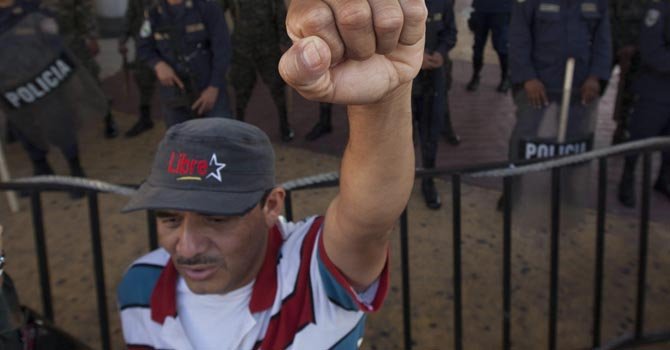Against ‘la mano dura’

(Photo: El Tiempo Latino)
One of the parties contesting Sunday’s election in Honduras has seen 18 of its activists murdered in the last 18 months. The LIBRE party’s presidential candidate is Xiomara Castro, the wife of the former president Manuel Zelaya, who was deposed in the military coup of July 2009. Despite the intimidation, LIBRE shows signs of breaking the cronyism of Honduran politics. Since the end of the dictatorship in 1982, the National Party and the Liberals, both products of the traditional oligarchy, have traded the presidency without disrupting the dominance of the 13 families that run the country. (Zelaya was a Liberal; the incumbent, Porfirio Lobo Sosa, is a Nationalist.) The current Liberal candidate is well behind, but the last opinion poll (they are banned in the month before polling day) gave the National Party’s Juan Orlando Hernández a one-point lead over Castro. The oligarchy is clearly rattled.
Hernández is an exponent of what Latin Americans call ‘la mano dura’ (the firm hand). He says he’ll put ‘a soldier on every corner’ to deal with the violence that makes Honduras one of the most dangerous countries in the world. Castro is decidedly less confrontational. She emphasises her proposal for a constitutional assembly that would reconfigure Honduran politics to give a voice to the poorest sectors and the many groups (teachers, artists, journalists, human rights activists) currently being persecuted. This was the project that Zelaya was pushing when he was forced from power. Castro’s other policies also borrow from her husband’s, which succeeded in narrowing the gap between rich and poor (it has since grown bigger again). While Hernández says he’ll meet violence with violence, Castro points to a pre-coup economy that was growing faster and with lower poverty and unemployment.
Will she be allowed to win? Hernández has not been idle. As head of Congress, he’s posted his own man as attorney general for an illegal five-year term. He defied the constitution again by replacing four members of the constitutional court when they had the temerity to throw out his plans to set up a new system of model cities, the pet project of a bunch of US neoliberals longing to test it out in ‘unoccupied’ land in Honduras. He has ensured that the army distribute and collect the ballot boxes for Sunday’s poll, so he controls both the election process and any legal challenges to it.
According to Dana Frank, Hernández ‘has all the ducks lined up for a fraudulent election’. Three US congressmen have written to John Kerry to express alarm that one presidential candidate ‘now dominates all the key institutions of the government’.
While its influence in much of Latin America is on the wane, in Honduras the US can still be decisive in calling an election as fair or not. After the coup in June 2009, its equivocation allowed the golpistas to succeed. Perhaps mindful of having appeared indecisive earlier, Hillary Clinton quickly called the post-coup elections as fair, despite widespread violence and massive abstentions. In the build-up to Sunday’s poll, Obama’s government has voiced concern about rising violence in Honduras and called for ‘free and fair’ elections. But it hasn’t condemned the violence against LIBRE, or responded to the continuing assassinations of indigenous leaders and journalists. The worry is not only that the ruling party in Honduras can manipulate Sunday’s poll, but that it may already have persuaded the State Department to endorse the result.
While its influence in much of Latin America is on the wane, in Honduras the US can still be decisive in calling an election as fair or not. After the coup in June 2009, its equivocation allowed the ‘golpistas’ to succeed. Perhaps mindful of having looked indecisive earlier, when post-coup elections took place Hillary Clinton quickly called them as fair despite widespread violence and massive abstentions. In the build-up to next Sunday’s poll Obama’s government has merely voiced concern about rising violence in Honduras and called for free and fair elections. But it hasn’t condemned the violence against LIBRE, more of whose candidates have been killed than of all the other parties together. Nor has it responded to continuing assassinations of indigenous leaders or of journalists. The worry is not only that the ruling party in Honduras can manipulate Sunday’s poll, but that it might already have persuaded the State Department to endorse the result.
Original post and comments: London Review of Books